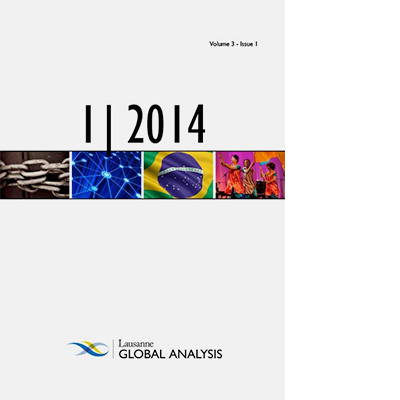Welcome to the January issue of Lausanne Global Analysis.
Whether you are planning to read the full articles or just the executive summaries, we hope that you find this issue stimulating and useful. Our aim is to deliver strategic and credible analysis, information, and insight so that as a leader you will be better equipped for the task of world evangelization. It’s our desire that the analysis of current and future trends and developments will help you and your team make better decisions about the stewardship of all that God has entrusted to your care.
In this issue we address the scourge of human trafficking, a critical issue of our times, and analyse how the church can play its part in confronting this form of slavery and helping its victims. We also assess the importance for Christian ministries in engaging more intentionally with the media and for leaders in integrating media into their mission strategies. Finally we tackle the linked themes of ministry to unreached indigenous people groups and of ‘ethnodoxology’ – a theological and anthropological framework guiding all cultures to worship God using their unique artistic expressions.
‘Human trafficking is a global crime affecting nearly all countries in every region of the world’, writes Abey George. Between 2007 and 2010, victims of 136 different nationalities were detected in 118 countries. The church is God’s vehicle to usher in shalom into the brokenness and oppression in the world. The church must therefore be the prophetic voice of transformation, keep hope alive and get engaged in the work. ‘The church needs to believe that it can truly be an agent of transformation in this broken and hurting world. If it does, it will become an unmistakable part of the process of God birthing his shalom in this world’, he concludes.
‘Wherever we live in today’s world, information and communication technologies increasingly influence our human lives, Christian witness, and Christian ministries’, says Lars Dahle. The missional issues related to media engagement are therefore of real significance to the global church. Media is the primary means by which news, ideas, and stories spreads. Therefore, if we are to ‘bear witness to Jesus Christ and all his teaching in every nation, in every sphere of society, and in the realm of ideas’ (The Cape Town Commitment), we cannot neglect the media. Three areas – media awareness, media presence, and media ministries – constitute a strategic approach for media engagement, he suggests.
‘Something new is happening in the indigenous church in Brazil’, writes Ronaldo Lidorio. It is growing fast and in totally new areas and groups. However, there is a shortage of mature indigenous leaders, and 121 ethnic groups are still under-evangelized or non-evangelized. Hundreds of new missionaries will be required to meet the challenge of sharing the gospel, planting churches, and engaging with their social needs. ‘It is time to partner with the indigenous church in Brazil, working together to reach the unreached, translate the Bible into all languages, and see leaders being trained’, he suggests. There are also lessons here for the global church and missionary movement, especially the need for better understanding and unity to meet today’s challenges, he concludes.
‘Locally grounded artistic communication is powerful for the expansion of the kingdom of God mainly because it is generally created and owned locally’, asserts Brian Schrag, as interviewed by Robin Harris. There is no need to translate foreign materials, and community artists are empowered to contribute to the expansion. Ethnodoxology increases the effectiveness of church planting efforts, developing healthy multicultural gathered worship expressions, discipleship and spiritual formation, evangelism and short-term mission outreach, and helping people respond to injustice and trauma. If we can help our brothers and sisters breathe new, redeemed life into their artistic traditions, all cultures will eventually use all of their gifts to worship, obey, and enjoy God with all of their heart, soul, mind, and strength, he concludes.
Please send any questions and comments about this issue to analysis@lausanne.org. The next issue of Lausanne Global Analysis will be released in March.

